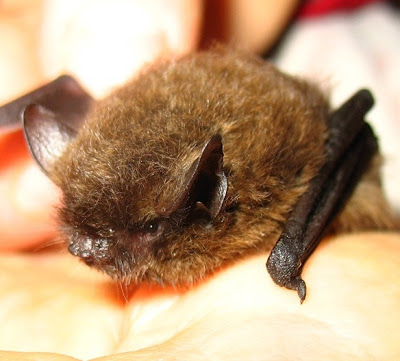 The JLT Natural History Society was pleased to sponsor a presentation on local bats by biologist Sarah Schmidt of Whidbey Island, on May 9, 2016, at the Quimper Unitarian Universalist Fellowship in Port Townsend.
The JLT Natural History Society was pleased to sponsor a presentation on local bats by biologist Sarah Schmidt of Whidbey Island, on May 9, 2016, at the Quimper Unitarian Universalist Fellowship in Port Townsend.
Did you know that Washington is home to fifteen species of bats? Bats are vital players in their native habitats. Many are considered “keystone species” because so many other animals and plants depend on them to survive. Fruit-eating bats disperse vast quantities of plant seeds and are critically important in re-greening damaged lands. Nectar-sipping bats pollinate innumerable plant species, particularly white-blossomed ones. The widespread, nightly consumption of tons of flying insects by bats is an enormous service to humans, their crops, and domestic animals. And, entire industries have been based on the uses of nutrient-rich bat guano.
Sarah Schmidt is a long-time educator and advocate for the appreciation and protection of bats. She shared stories and photos on bat behavior and adaptations, their importance to the balance of natural systems, and threats to their health and conservation.
For more information on Sarah and our local bats, see this excellent article on “Living with bats on Whidbey Island” at
http://wildwhidbey.blogspot.com/2011/12/living-with-bats-on-whidbey-island.html


 At different times of the year, trilliums and rhododendrons bloom, ducks float on the tranquil lake, and songbirds nest along the shoreline.
At different times of the year, trilliums and rhododendrons bloom, ducks float on the tranquil lake, and songbirds nest along the shoreline.
 The Natural History Society Book Club’s choice for the month of May is The Triumph of Seeds by Thor Hanson. We will meet on Monday, May 23, 3:30 – 5:00 at the Ilahee Preserve shelter. E-mail Jean at
The Natural History Society Book Club’s choice for the month of May is The Triumph of Seeds by Thor Hanson. We will meet on Monday, May 23, 3:30 – 5:00 at the Ilahee Preserve shelter. E-mail Jean at The JLT Natural History Society was pleased to sponsor a presentation on local bats by biologist Sarah Schmidt of Whidbey Island, on May 9, 2016, at the Quimper Unitarian Universalist Fellowship in Port Townsend.
The JLT Natural History Society was pleased to sponsor a presentation on local bats by biologist Sarah Schmidt of Whidbey Island, on May 9, 2016, at the Quimper Unitarian Universalist Fellowship in Port Townsend.